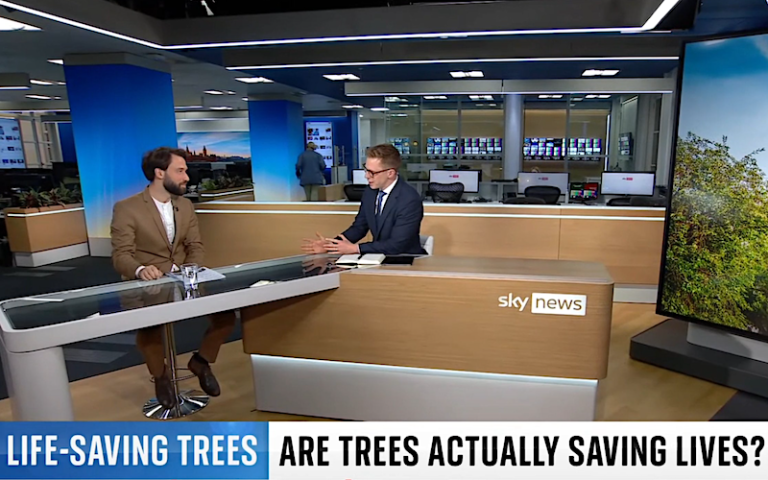UCL researcher Oscar Brousse appears on Sky News to promote city trees research
26 April 2024
UCL Institute of Environmental Design and Engineering research team explains how trees can save our lives in cities

A tree could save your health – really. The Greater London Authority estimates that there are over 8 million trees in London. In recent weeks, UCL research has been published which shows that between 2015-2022 trees could have saved about 150 lives in the capital from heat related ill-health. This research was previously led by former UCL colleague Jonathan Taylor (now in Tampere University, Finland), and the team includes Oscar Brousse, Clare Heaviside and Charles Simpson from the UCL Institute of Environmental Design and Engineering.
Following the publication of “How trees saved 153 lives in London in eight years”, in the 'i' (Independent) Newspaper on 22 April 2024, the researchers set out to use traditional and social media to raise awareness of their sustainability research. Accordingly, Oscar Brousse was invited to appear on the Sky News breakfast news broadcast on 23 April 2024 to answer questions about the research.
After explaining to host Gareth Barlow how trees cool our cities through shading, reflection of part of the sunlight (infrared), and evapotranspiration (which refers to how trees 'sweat'), Oscar explained that their study found that this cooling brought by trees could lower heat-related mortality in cities. As any city-dweller will likely know, cities are generally hotter than their rural surroundings as they trap heat in their complex three-dimensional environment and therefore potentially lead to an additional burden during heatwaves.
The research study showed that the current level of tree coverage in London could have reduced this harm to health by 16% (153 deaths) from 2015 to 2022. This could be further amplified following current London’s strategy in planting trees (by an additional 10%) or could reach a maximum reduction of 55% if all available space in London was covered by trees.
As Oscar revealed during the broadcast, 153 deaths were prevented by the current coverage of trees in London over the past eight years:
This may seem like a little number, but we see that this effect is really amplified the further our temperatures would increase, which is to be expected with climate changes in the future.
Indeed, Oscar went on to explain that this number would consist of prevented deaths per year instead of every eight years, which demonstrates rather dramatically how trees are important in protecting city-dwellers frmo the ill-health caused by excessive urban heat.
Asked by the Sky News presenter about the relevance and application of the the team's research findings to other cities in the UK, Oscar explained that even if certain differences would exist in the magnitude of the given protection, it is likely that the benefits would be similar for the same amount of tree coverage. Furthermore, Oscar emphasised that one of the novelties of their study was that their estimate of those benefits was made possible due to the use of personally owned weather station measurements, which were shared publicly by their owners. This allowed the researchers to cope with a general shortage of weather data in UK cities, and also to match the temperatures which are observed from those sensors to the surrounding tree coverage – which isn't feasible with official UK Met Office weather stations. Closing the conversation in the broadcast, Oscar argued that he would encourage other cities to perform similar studies in order to get a better estimation of the benefits brought by trees in cities from the country.
Want to learn about the publication?
'The potential of urban trees to reduce heat-related mortality in London' was published in IOP Publishing Environmental Research Letters and is part of the health and economic impacts of reducing overheating in cities (HEROIC) project funded by the Wellcome Trust.
Links
- Learn more about Oscar Brousse's work.
- Learn more about Clare Heaviside's work.
- Learn more about Charles Simpson's work.
- Learn more about Jonathan Taylor's work.
Image credit: Oscar Brousse / Sky News
 Close
Close

